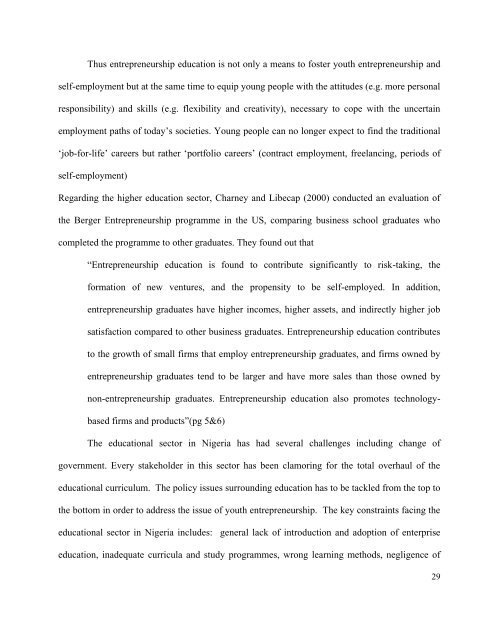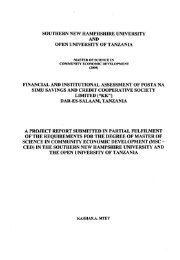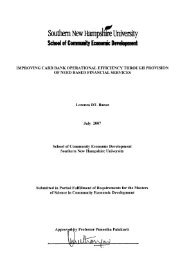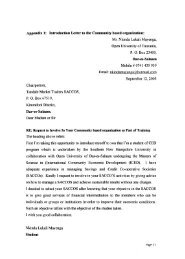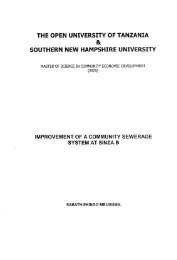Promoting youth entrepreneurship in Lagos, Nigeria - SNHU ...
Promoting youth entrepreneurship in Lagos, Nigeria - SNHU ...
Promoting youth entrepreneurship in Lagos, Nigeria - SNHU ...
You also want an ePaper? Increase the reach of your titles
YUMPU automatically turns print PDFs into web optimized ePapers that Google loves.
Thus <strong>entrepreneurship</strong> education is not only a means to foster <strong>youth</strong> <strong>entrepreneurship</strong> andself-employment but at the same time to equip young people with the attitudes (e.g. more personalresponsibility) and skills (e.g. flexibility and creativity), necessary to cope with the uncerta<strong>in</strong>employment paths of today‘s societies. Young people can no longer expect to f<strong>in</strong>d the traditional‗job-for-life‘ careers but rather ‗portfolio careers‘ (contract employment, freelanc<strong>in</strong>g, periods ofself-employment)Regard<strong>in</strong>g the higher education sector, Charney and Libecap (2000) conducted an evaluation ofthe Berger Entrepreneurship programme <strong>in</strong> the US, compar<strong>in</strong>g bus<strong>in</strong>ess school graduates whocompleted the programme to other graduates. They found out that―Entrepreneurship education is found to contribute significantly to risk-tak<strong>in</strong>g, theformation of new ventures, and the propensity to be self-employed. In addition,<strong>entrepreneurship</strong> graduates have higher <strong>in</strong>comes, higher assets, and <strong>in</strong>directly higher jobsatisfaction compared to other bus<strong>in</strong>ess graduates. Entrepreneurship education contributesto the growth of small firms that employ <strong>entrepreneurship</strong> graduates, and firms owned by<strong>entrepreneurship</strong> graduates tend to be larger and have more sales than those owned bynon-<strong>entrepreneurship</strong> graduates. Entrepreneurship education also promotes technologybasedfirms and products‖(pg 5&6)The educational sector <strong>in</strong> <strong>Nigeria</strong> has had several challenges <strong>in</strong>clud<strong>in</strong>g change ofgovernment. Every stakeholder <strong>in</strong> this sector has been clamor<strong>in</strong>g for the total overhaul of theeducational curriculum. The policy issues surround<strong>in</strong>g education has to be tackled from the top tothe bottom <strong>in</strong> order to address the issue of <strong>youth</strong> <strong>entrepreneurship</strong>. The key constra<strong>in</strong>ts fac<strong>in</strong>g theeducational sector <strong>in</strong> <strong>Nigeria</strong> <strong>in</strong>cludes: general lack of <strong>in</strong>troduction and adoption of enterpriseeducation, <strong>in</strong>adequate curricula and study programmes, wrong learn<strong>in</strong>g methods, negligence of29


